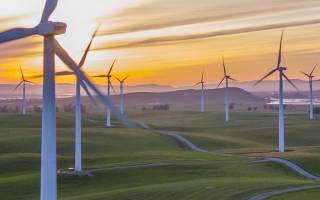Towards a Green and Just Recovery from COVID-19: Building Forward rather than Back
29 July 2021
Could post-pandemic recovery present a turning point for addressing the climate and nature crises?

By Julia Kreienkamp (UCL Global Governance Institute)
COVID-19 has brought to the fore the urgent need to mitigate and build resilience to future systemic risks, above all climate change, ecological degradation and rampant inequality. Amid a flurry of calls for a ‘green recovery,’ the pandemic could present a turning point for the transition to a net-zero economy. However, there is a real risk that post-pandemic policymaking will deliver little more than green rhetoric, while reinforcing unsustainable and unfair economic growth models in an effort to facilitate a rapid return to business-as-usual. Although 2020 saw a substantial drop in global CO2 emissions due to pandemic response measures, the overall effect on global warming trends has been negligible. This year, emissions could see the second-largest increase in history, driven by a significant rebound in demand for fossil fuel energy. Other immediate environmental benefits of lockdowns and other pandemic response measures – e.g. reduction in pollution and the resurgence of wildlife in some areas – have also proven short-lived. Without decisive course correction, post-pandemic recovery efforts are likely to prove a wasted opportunity for addressing the climate and nature crises.
Government responses announced so far present a mixed picture. While policymakers around the world have put forward ‘green’ stimulus packages, much of the post-COVID public stimulus spending continues to flow into unconditional support for fossil fuel industries. In the UK, which is set to host a key international climate summit later this year, ambitious mitigation targets sit uncomfortably alongside policy proposals for new oil and gas explorations in the North Sea, a new coal mine in Cumbria, and tax cuts on domestic flights. COVID-19 has also set in motion a number of contradictory trends with regard to energy use, consumption patterns, and mobility. For example, while poll data suggests that many Europeans intend to adopt more sustainable lifestyles in the wake of the pandemic, including flying less and eating less meat, fear of infection has shifted preferences from public to private modes of transport, with many intending to continue driving more. Similarly, the trend towards remote working has led to emission reductions in some instances, however, in others, domestic energy use and increased non-work travel has more than compensated for emissions saved through reductions in commutes and office maintenance.
These ambiguities underscore the urgency of embracing a systemic approach to transition policies which is orientated towards addressing the complex interdependencies across the socio-economic, political, cultural and technological systems that underpin all human activity. The momentum for radical change has never been higher. In line with the long-term goals of the 2015 Paris Agreement on climate change, more than 130 countries around the globe have committed to net-zero targets by mid-century. Costs for renewable energy technologies continue to fall, with a majority of new wind and solar projects now undercutting even the cheapest fossil fuel options. And, at least in the UK, the perceived urgency of climate action among the general public appears to have increased rather than decreased in the wake of the pandemic. Yet, current policies are not aligned with long-term climate targets and concerns are rising that net-zero promises are premised largely on offsetting and untested carbon removal schemes rather than systemic decarbonisation efforts. Technological innovations in energy, transport and other key sectors are without doubt essential prerequisites for the transition. But without a change in the underlying systems and finance flows that shape dominant production and consumption patterns, we risk being stuck in an ‘improvement trap’ whereby our economies become environmentally more efficient but do not reach required levels of sustainability.
There is also increasing recognition that a lasting ‘green recovery’ from COVID-19 must be just and socially inclusive. Public backlash is likely if the costs of decarbonisation policies are not distributed fairly and if those at the receiving end of systemic restructuring efforts – e.g. those currently employed in fossil fuel industries – are excluded from policy discussions. Local authorities, if sufficiently resourced and empowered, could play a vital role in enabling these conversations, including through deliberative mechanisms such as citizens' assemblies and citizens’ juries. These and other platforms could also serve to give a greater voice to young people, children and unborn generations which will be most affected by today’s political decisions. Meaningful participation is not just important to ensuring public consent for transitional policies, but can also yield smarter policy solutions better suited to responding to realities on the ground. Unfortunately, COVID-19 appears to have done little to incentivise governments to increase policy transparency and responsiveness to lived experiences. Indeed, some countries have used the pandemic to crackdown on civil liberties and limit opportunities for public consultation and participation.
If COVID-19 is to be a wake-up call, policy change must be grounded in mindset change, cognisant of the dynamic and deeply entangled interactions between human activity and the planet. The environment is not simply a part of the economy, rather our economies are deeply embedded in complex Earth's systems that we neither fully understand nor control. There are indications that these insights are making inroads in policy circles. The recent Dasgupta review, commissioned by the UK government, concludes that we can no longer afford to treat economics as separate from nature. In the EU too, efforts are underway to supplement traditional measures of growth, notably GDP, with new indicators that reflect progress made on environmental protection and social equity. The post-COVID recovery presents a critical opportunity to scale and speed up such policy innovation. Extraordinary levels of creativity, political will and collective commitment will now be necessary to steer our socio-economic systems towards sustainable pathways that benefit both human and planetary wellbeing.
 Close
Close


